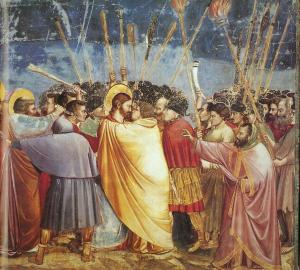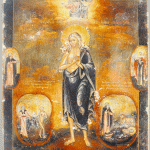
Judas was an Apostle. He walked with Jesus. He listened to Jesus. He saw Jesus perform miracles. Indeed, he was sent out to the people of Israel as a preacher who proclaimed the coming of the kingdom of God and revealed the reality of that kingdom by performing miracles:
These twelve Jesus sent out, charging them, “Go nowhere among the Gentiles, and enter no town of the Samaritans, but go rather to the lost sheep of the house of Israel. And preach as you go, saying, `The kingdom of heaven is at hand.’ Heal the sick, raise the dead, cleanse lepers, cast out demons. You received without paying, give without pay. Take no gold, nor silver, nor copper in your belts, no bag for your journey, nor two tunics, nor sandals, nor a staff; for the laborer deserves his food (Matt. 10:5-10 RSV).
It is very hard for us to understand how and why someone who was so close to Jesus, so trusted and loved by Jesus, could later betray him. And yet, we know, this is what Judas did. He had soared to great heights, but yet, there was something inside him which make him seek for even greater heights which he was not ready for. What was it that motivated him? We are told that he sold Jesus out for money, but what he was offered was so little it is hard to think that was the reason why Judas betrayed Christ. Perhaps it is pride, and not just simple avarice, which got the best of him. It is possible that he thought so highly of himself that he thought he knew better than everyone else, even Jesus, as to what needed to be done. Many speculate he did not want to betray Jesus; rather, he wanted to force Jesus’ hand, to make Jesus become the militaristic messiah he and others expected him to be. Perhaps Judas wondered that if the kingdom of God was at hand, why was Jesus doing nothing. He wanted to know why Jesus let Rome continue to control the Holy Land, why, indeed, did he not act with the authority he had and become the messianic king everyone expected. It is possible Judas was trying to manipulate the situation so as to force Jesus to act. Maybe he hoped that when the soldiers came to arrest Jesus, Judas thought Jesus would finally reveal all his power and take possession of the messianic throne; of course, when Jesus did nothing but let himself be taken by the Roman authorities and later be crucified, that was the end of Judas’ messianic expectations. If this is so, then when he saw all he wished for crumbling apart from him, his pride led him to despair, and it is that despair which finally brought Judas to his untimely end. While we do not know if this was the line of reasoning lay behind Judas’ betrayal, we do know that something led to it, something deep inside Judas had him abandon Jesus. All the good Judas had seen, all the good he himself had done in the name of Jesus, came to naught.
What happened to Judas should be a warning to all of us. If we do good in the name of Jesus, bringing many people into the faith, indeed, even if perform miracles, we must remember that it will be as nothing if we fall away from the faith. We must not become so attached to the good which we have accomplished, thinking it means we cannot and will never be corrupted and turn away from the teachings of Christ. Pride can get the best of us. Thinking we are so great, we end up thinking we can do no wrong. Those who would warn us about our pride will be ignored, for we will be so caught up in our own self-glorification we will not be able to accept any criticism, no matter how slight it is.
Paul warned us against such thinking, for he pointed out what is important is the Gospel in its fullness. He said that we should not hold anyone who turns away from the fullness of the Gospel credible, no matter who they were and what they had done before (cf. Gal. 1:6-9). The Gospel is full of charity and grace. Performing miracles, speaking in tongues, even saying good and truthful things without that charity is far from the fullness of the Gospels. All such things can be used to lead us and others astray if we do not first hold onto love (cf. 1 Cor. 13:1-3). We must always remember to serve others, not ourselves and our ego.
Historically, many great men and women who have done extraordinary things in the name of Christ, promoted themselves so much that they made it all about themselves and so, like Judas, fell from grace and abandoned the teaching of Christ. Because of what they had done before, people would listen to them and follow them after they had gone astray. Non-Christians, watching from outside the faith, would look to them as examples of what happens to people when they become Christian and so would see them as examples as to why no one should become a Christian. Thus, as St. Isaac the Syrian warned us, those with pride can easily fall prey to their own inordinate passions, making them so unruly and disagreeable that they become stumbling blocks for others:
Many have accomplished mighty acts, raised the dead, toiled for the conversion of the erring, and have wrought great wonders; and by their hands they have led many to the knowledge of God. Yet after these things, these same men who quickened others, fell into vile and abominable passions and slew themselves, becoming a stumbling-block for many when their acts were made manifest. For they were still sickly in soul. But instead of caring for their souls’ health, they committed themselves to the seal of this world in order to heal the souls of others, being yet ill in health; and, in the manner I have stated, they have lost their souls and fell away from their hope in God.[1]
How many times do we see when some priest, bishop or cardinal gain notoriety that they make everything about their own wishes, and in doing so, cause a scandal to the church when the church does not promote their particular desires? How many theologians and philosophers, likewise, believe so much in their own intellectual prowess that they become so stuck in their own thinking that they are unable to engage and embrace the fullness of the truth? Just because people have done great things in the past, just because they have brought many people to the faith at one time in their life, just because they know much and are able to share with others what they know, does not mean they represent the fullness of the faith. Everyone must recognize, in all humility, their own limitations; no one should set themselves above the whole. No one should seek to promote themselves for this is what causes people to follow Judas. For when they think that they know better than everyone else, they will try to force things to fit their own desires instead of fitting themselves with the fullness of the Gospel.
Love, humble love, is what we need to embrace. It is best for us to pay no attention to our own virtues. Instead, we should always realize our own foibles, our own weaknesses, for this will help us remain humble and overcome all vain attempts to promote ourselves over and above everyone else. Humility, not pride, is the key. Humility allows us to love others, while pride does not, for pride has us so attached to ourselves we will never be able to see others as people to be loved. Humility opens us up; it allows us to realize our own limitations. It makes sure we do not think we can and should do all things ourselves. We should stop trying to make plans which rely upon ways we think we are great; instead, we should center ourselves upon simple, humble love, keeping such love, and not ourselves, the focus of what we do. “Let no one falsely exalt himself because of his virtues, let no one needlessly be afraid of his lack of strength; anyone who is filled with love for his brother gives clear evidence that he belong to the lot of the elect, because he has deserved to have his portion in the land of the living.”[2]
So long as we have love, we will not focus on ourselves but on others, but once we begin to focus on ourselves, our love dies. Without love, we will try to make ourselves great, and like Judas, try to force things to come about as we wish. Similarly, like Judas, we will find out things will never work the way we think they should. If and when that happens, we will come to a point of crisis, where everything can change. Will we finally give up our grand designs and humbly return to Christ, or will we continue to push those designs more and more, until at last, all we have is the despair which comes about when they all fail?
[1] Saint Isaac the Syrian, The Ascetical Homilies of Saint Isaac the Syrian. Trans. Monks of the Holy Transfiguration Monastery. Rev. 2nd ed (Boston, MA: Holy Transfiguration Monastery, 2011), 145 [Homily 4].
[2] Venerable Bede, “Commentary on 1 John” in Commentary on the Seven Catholic Epistles. Trans. Dom. David Hurst, OSB (Kalamazoo, MI: Cistercian Publications, 1985), 92.
Stay in touch! Like A Little Bit of Nothing on Facebook.
If you liked what you read, please consider sharing it with your friends and family!












